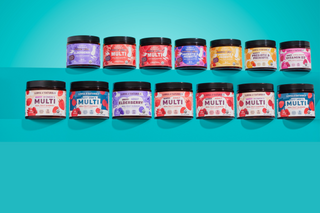
Key Points:
- Vitamin C is a key essential nutrient for your child’s health, supporting their immune system and nervous system, and keeping their body tissues healthy.
- The human body doesn’t make or store vitamin C, which means your child needs to get it from their food every day.
- Whole foods are the best place to start, and many common fruits and vegetables are high in vitamin C for kids.
- If your child is a picky eater or has a nutrient absorption condition, they may not get enough from whole foods.
- In that case, a dietary supplement can help to fill the nutrient gap.
At the very first sign of a sniffle, you've probably downed a glass of orange juice or reached for a vitamin C supplement — and you’d be wise to do so as it gives your immune system a substantial boost. That being the case, you may be wondering, “Can kids take vitamin C too?” The answer is a resounding “yes!”
While it’s perhaps best known for immune support, vitamin C for kids also has other important roles to play in your child’s overall health and wellness.
Let’s look at what vitamin C is and why it’s so important for your little one’s health. We’ll also explore some excellent sources of vitamin C for kids so you can make sure they’re getting enough of this critical nutrient.
What Is Vitamin C for Kids?
Vitamin C is an essential, water-soluble nutrient that your little one’s body needs for a range of important functions. Otherwise known as ascorbic acid, the human body doesn’t make or store vitamin C, so you need to make sure your child gets enough vitamin C from their daily diet.
Benefits of Vitamin C for Kids

It may be best known as an immune booster, but vitamin C for kids has many health benefits. For example:
- Vitamin C for kids is a powerful antioxidant, protecting cells from oxidative damage by free radicals and making sure that the immune system can fight back against infection and inflammation.
- It helps support the responses of both the innate and adaptive immune systems to infection.
- While it may not prevent a cold for the average person, regular supplementation can reduce its duration.
- Vitamin C builds and maintains collagen, keeping the skin healthy, so it can protect your little one's body from germs.
- It also supports wound healing and reduces bruises from those inevitable bumps and falls.
- The body needs vitamin C in order to form and maintain many body tissues, including bones, joints, teeth, gums, and muscles.
- It helps to convert tryptophan, which is an amino acid, into serotonin, which is a neurotransmitter that helps with nervous system signaling.
- It improves the absorption of iron, another critical nutrient that helps produce the red blood cells that move oxygen around your child's body.
How Much Vitamin C Does Your Child Need?

The amount of vitamin C your little one needs depends on their age. It’s measured in milligrams of vitamin C, which is often shown as mg of vitamin C:
- 0-6 months: 40 milligrams
- 7-12 months: 50 milligrams
- 1-3 years of age: 15 milligrams
- 4-8 years of age: 25 milligrams
- 9-13 years of age: 45 milligrams
- 14-18 years of age: 75 milligrams for boys and 65 milligrams for girls
It's worth knowing that supplement labels usually show vitamin C content as a percentage of the Daily Value (DV) — or the average vitamin C need of anyone over the age of 4. This isn't really designed with children in mind, so rather check for the actual amount of vitamin C in milligrams and compare it with the recommended amount for your child's age.
Vitamin C deficiency is quite rare in the United States, but it can happen if your child is a picky eater or has a condition that reduces the absorption of nutrients. Strange as it may sound in this day and age, they may then be at risk of developing scurvy. You probably know this as a disease historically suffered by seafarers during long voyages, before we had modern conveniences to keep food fresh. Those pirates your little one’s so fascinated by probably weren't so healthy.
If you’re concerned about your child's vitamin C intake, consult your health care practitioner and get them to do a blood test to check for vitamin C deficiency.
How to Boost Vitamin C for Kids

If you want to boost your child’s intake of vitamin C — or any other nutrient — it’s always a good idea to start with whole foods, as natural vitamin C is potentially absorbed better than the synthetic version. In fact, a study found that the natural vitamin C in food was absorbed 1.74 times better into human red blood cells than synthetic ascorbic acid. This may be because the vitamin C from food is complexed with many other nutrients, which supports bioavailability.
Luckily, vitamin C is found in many common foods that kids like — and some they often don’t. It makes sense to start with the ones they like and then — if need be — slowly introduce others they may be less certain about.
Aim to get them eating a variety of different colored foods. Try to serve them raw or lightly cooked wherever possible as heat does reduce vitamin C content.
Side note: Be aware that some foods fortified with vitamin C for kids are also packed with sugar, which can have many other negative effects on your child’s health.
These are some excellent, natural sources of vitamin C for kids:
- Citrus fruits, like oranges, tangerines, grapefruit, and lemons
- Guavas
- Lychees
- Papaya
- Berries, like strawberries, raspberries, and blackcurrants
- Melons
- Kiwi fruit
- Mangos
- Bell peppers
- Tomatoes
- Potatoes
- Snow peas
- Apples
- Broccoli
- Brussels sprouts
- Green leafy veggies, like spinach and kale
While there’s quite a variety there to choose from, if you’re still worried that your child isn’t getting enough vitamin C, you may want to consider a children’s vitamin C supplement.
Vitamin C Supplements

Vitamin C for kids is freely available as a dietary supplement on its own, which can act as a great booster to your child's vitamin C intake.
It’s also a common ingredient in kids’ multivitamin supplements, or blended with one or more other important nutrients, like vitamin A, vitamin B, vitamin D3, calcium, echinacea, or probiotics.
These options come in multiple forms, ranging from chewable tablets to liquid vitamins or powders that can be dissolved into a drink mix.
Chewable vitamin C gummies and multivitamin gummies are especially popular as they’re very child-friendly. They come in interesting shapes and great-tasting flavors that kids enjoy, with fruit flavors being especially popular. Flavored gummies are available in tangerine, elderberry, and orange flavor, just for starters.
Important note: Vitamin C does interact with certain medications, like aspirin, ibuprofen, and chemotherapy drugs. It can also have side effects like headaches, nausea, diarrhea, gas, or heartburn if your child takes too much. So before you give your child extra vitamin C in the form of a supplement, consult your pediatric professional.
Best Vitamin C Gummies for Kids
If you’re wondering about the best vitamin C gummies for kids, there are a few key factors to look for.
Check that the gummies are free of sugar in its various forms — which can include ingredients like corn syrup or fructose — and artificial sweeteners. You’ll also want to make sure they contain no artificial flavors or colors and are gluten-free.
One high-quality supplement that ticks all these boxes and more is Llama Naturals Multivitamin Gummies for Kids. They’re packed with all the essential vitamins your child needs to stay healthy.
Made from real fruit, they’re slow-cooked to preserve all the nutrients, and since they’re USDA-certified organic, you know they contain nothing nasty. And very importantly, they’re delicious so you’ll be hard-pressed to keep your kids away from them (note that you do need to do this — unsupervised access to even the most natural of supplements can be dangerous).
Vitamin C for Kids Keeps Them Healthy and Strong

Vitamin C is an essential nutrient that kids need to get every day. It supports overall health, especially the immune system, nervous system, and tissue growth and maintenance.
Whole foods are the best sources of vitamin C for kids, and if you aim to serve a variety of fruits and vegetables regularly, they'll probably get enough vitamin C that way. However, if your child is a picky eater or suffers from a condition that affects nutrient absorption, they may need a dietary supplement.
If you do invest in a supplement, make sure it’s high quality and delicious too. That way your little one will be begging for their daily dose of vitamin C, keeping them as healthy and energetic as they deserve to be.
Llama Naturals is a plant-based nutrition brand that has created the World's First Whole Fruit Gummy Vitamins that are made with no added sugar and whole-food vitamins. They are USDA Organic, Vegan, Gluten Free, free of common allergens, and are slow-cooked on low heat to retain rich phytonutrients & fruit flavor. It’s a win-win gummy vitamin that the whole family will love.





